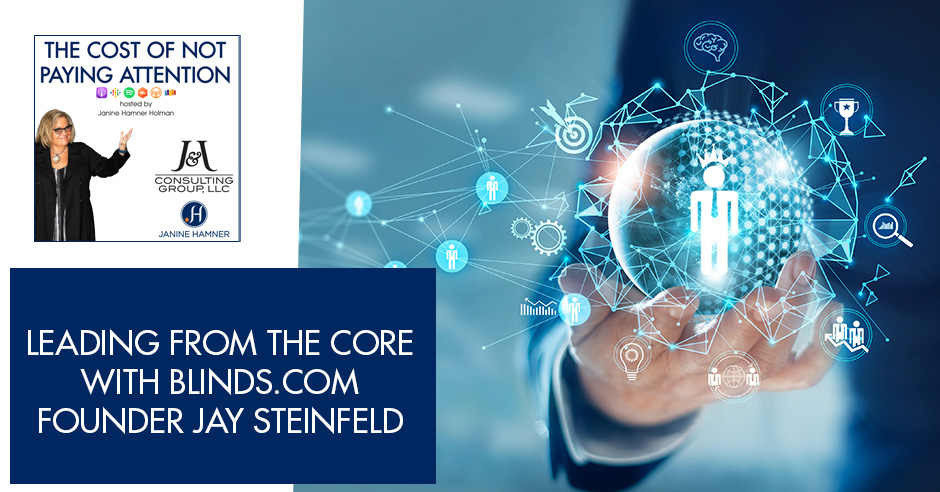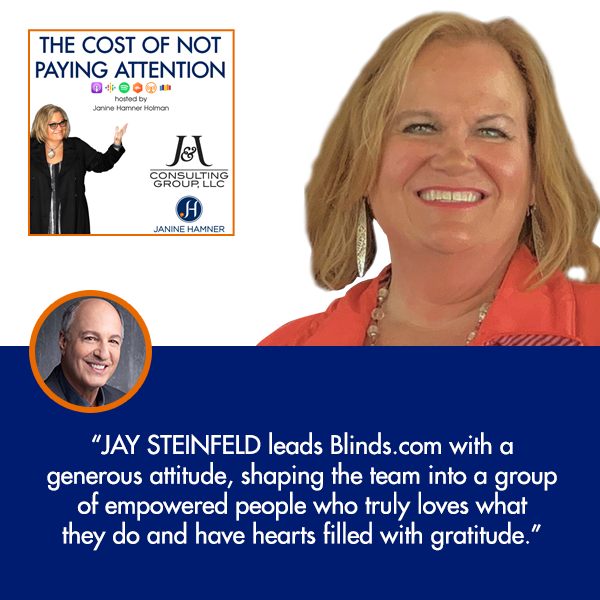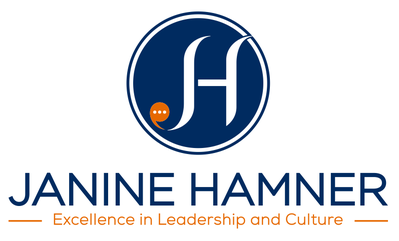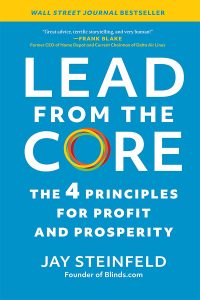
Society often dictates that stingy people are the ones who earn lots of money because they know the right way to hustle and do not resort to cutting corners. But for Jay Steinfeld, having a generous attitude trumps that uninspiring mindset. Joining Janine Hamner Holman, the Founder of Blinds.com explains what being a generous leader and mentor means to him. He discusses how this attitude empowers people to perform at their best and even go beyond expectations. Jay also shares how a culture of generosity can help address challenges caused by the Great Resignation and the rise of the millennial/Gen Z workforce.
GUEST: Jay Steinfeld | LinkedIn | Visit their Website: www.JaySteinfeld.com
HOST: Janine Hamner Holman | [email protected] | LinkedIn, Facebook, Instagram, and Twitter |
Book me to Speak! Subscribe to my Newsletter!
—
Listen to the podcast here
Leading from the Core with Blinds.com Founder Jay Steinfeld
What am I paying attention to now? Generosity. Often, when we hear that word, we think of being generous with our money. We think of people who give money to charities and they might volunteer, but generosity is also a way of being. You could ask someone who is generous, “Can I pick your brain about something?” Not only is it likely that they would say “Sure!”, but they would feel honored to help you on your road. If you were to say to a generous person, “What you’re eating looks good. Can I trade you a bite of mine for a bite of yours?” They would say either, “I would love a bite of yours,” or “I don’t need a bite of yours but, yes, of course, have a bite of mine.”
I encourage you to expand your idea of what it means to be generous. As we think about being generous with our time, the gifts of our life and experience, our wisdom, or mentoring people along the way, I believe that the world will continue to be a better place when we embrace generosity. My guest is a super generous person who I am thrilled to talk with today.
Jay Steinfeld founded, and was the CEO of, Blinds.com, the world’s number one online window covering retailer. Jay created this from nothing in 1996 for just $3,000 out of his garage. It was eventually acquired in 2014 by Home Depot. Jay remained its CEO and later joined the Home Depot online leadership team. He’s also written a wonderful book called Lead From The Core, The Four Principles For Profit And Prosperity, which is also a Wall Street Journal Bestseller. I encourage you to check it out.

Welcome, Jay.
Janine, thank you. That was awesome. I appreciate that so much.
You are very welcome. When I think about generosity, you are one of the people who comes to mind. I had heard you on another podcast and I reached out to you and you immediately responded, “Yes, of course. I would be happy to come and be on your show.” I love the way that you show up in the world and I really appreciate you for that.
Thank you. I appreciate that.
You’re welcome.
Jay, tell me what is something that you have become aware of both while you were at Blinds.com, when you were at Home Depot, or at any other time in your professional life. What have you become aware of that people either intentionally or unintentionally aren’t paying attention to and what’s the cost of that?
There are a lot of things. People are not paying attention to their health and what’s going on at the moment. They’re distracted by something else. If we want to stay on the topic of generosity and people in general, people have this idea that you’re supposed to be stingy. In order to make a lot of money, you don’t spend a lot of money. You do the least amount possible and see if you can get away with it. How little can you train your employees? How little can you pay them? How little can you give your customers and see if you can cut away some of the quality without them noticing?
Generosity is the inverse of that. It means giving the most you can give. What is the most you can give to your customers and still be, in the long-term, in the best interest of the business? When you start doing that, you think, “I’m not going to not train my people because if I train them, they’ll get good and I’ll make more money.
If they know that I care about them and I’m being generous with my attention and listening to them, they’re likely to stay.” Our turnover at Blinds.com was only 8%. When you have low turnover, you have low employment cost, and which also means higher profit. When you know people are going to be staying, you can invest more in them. You’re not going to invest in them, then all of a sudden, they go someplace else.
Because turnover is high in so many places, people are afraid to invest. It is generous to help people become the best they can be. That was our mission at Blinds.com. It’s literally to help people become better than what they ever believed possible. Your employees will stay when they know that it’s not a slogan, or something that you’ve just put on a plaque on the wall by the HR department, but you mean it, you put your actions behind it, and you are attentive to people. When they say, “I’d like to ask you a question,” and you reply, “Why don’t you schedule something with me?” Or you go to their desk and say, “What is it? What do you have on your mind? Tell me about it.”
People will stay and do so much more than what you ask. In fact, you might not even have to ask. You can be a much better leader by not having to tell people what to do. People don’t want to be told what to do. They need to know where you’re going. Another way to be generous is to make it clear where you’re going. Know where that vision is that you’re going to and how that person fits in. When you do all these things, people feel good about themselves.
People don't want to be told what to do. Be generous to the people you lead by making it clear where you're going, what your vision is, and how they will fit in there. Share on XThey feel that they’re getting better as a result of being in your presence. They feel that they’re becoming a better person because they’re working at Blinds.com, not because they’re achieving $100 million or $500 million in sales, but because they’re becoming better. When they become better, they’re better not only on the job, but they’re better at home, with their children, significant others, and in their communities.
That becomes an organization that is autonomous excellence, where the company gets better because everybody feels compelled to be generous, not only to themselves but to everyone else. If you have everybody getting better, evolving, being generous with their time and attention, and helping everyone else, it’s awesome. You can step back and say, “You don’t even need me.” I left, finally, a couple of years ago. It was an easy decision. I was like, “You guys don’t need me anymore. I’ve done my job.”
I love what you’re talking about. What you’re talking about here is the way that I work with organizations. Those are the kinds of organizations where I work with leaders to help them build. It can be a tricky thing because if you’re coming into an organization as a consultant as I am, they have their organization already, have the good things, not so great things, and dysfunctional things that they’re doing. I say to the CEO of the organization, “Here’s how we can create it to be in the future. You’re having problems like everyone else with the Great Resignation. Maybe you’re having some more problems because you’ve never trained your leadership team or your mid-level managers.”
Whether it’s me, somebody else, or a CEO who is reading this, how would you suggest they start making that transformation in the organization? When one makes that choice, they start to devote resources: time, energy, and or money. Those are essentially the three main resources that we have.
Whether we’re talking about devoting organizational time, money, or energy to this effort to have our people be more engaged, thrive as part of the organization, and feel that sense of commitment, ownership, and psychological safety at work, all of which is what you’re talking about, how can someone get started? How do you deal with overcoming the fear of spending money? All the pundits say we may be going into a down economy yet again. It feels more scary to devote those resources away from what we think of as the bottom line and to our internal operations.
Janine, that’s a good question, but the answer doesn’t have to be more money that you’re giving. We started this whole episode with the idea that generosity is not necessarily about money. It could be something like this. How about spending time every month with your direct reports and asking them, “What do you want? Where do you want to be in five years? What am I doing that you want me to keep doing, do more of, or stop doing?”
That doesn’t cost anything. What that does is it says, “You are important to me and I care about you. I want to make sure you are happy. Not that I want you to do what I told you to do. In fact, I would hope that you would do more than I told you to do because you probably know more about what you should be doing than I do.” Ask questions, and then listen and do something about it.
If they say something like, “If you’re making them feel safe and you mention safety, then they won’t be afraid of saying something like, ‘In five years, I want to start my own company.’” A lot of leaders will gulp and go, “This person is on their way out. I’m not investing anymore.” The people who tell or are safe and feel confident that they’re telling you what they want are going to be your best employees. Help them go somewhere else in five years. In those five years, they’re going to be so much better because they feel safe that they were able to share that with you.
Isn’t it amazing when you have somebody who has worked with you who goes out on their own and does something spectacular? That is your greatest success when your people go off on their own and do something without you. That means you helped them get there, and there’s nothing better than that. It’s like if you have children, you want them to be independent and achieve what they want. It’s nothing more than that. It’s asking, listening, and then doing something about it. With you, they will actually get there faster than going out on their own and trying to do it by themselves because you are now willing to help them get there. People will stay with you because you want them to get somewhere else.

Generous Attitude: Leadership success is when you have somebody with whom you work who goes out on their own and does something spectacular.
There are so many people who had told me at the beginning, “I thought I was only going to stay with you for two years, maybe three at the most.” Now it’s 12 or 15 years later. They’re still there and growing. They know that they’re going to become better than they ever believed possible still, and there is so much more headroom to go. It’s why I stayed myself after selling my company and not needing a penny more for the rest of my life.
I stayed at Home Depot for seven years because we were achieving something greater than we could have done when I was on my own. For the people who were at Blinds.com, virtually no one left for three years after the sale. Have you ever heard of that? It’s because we were all achieving something that we all wanted and we could do it easier with Home Depot than without.
As a result, we were becoming better, evolving, trying new things, experimenting, and having these debates. It was fun, which is our fourth core value: enjoy the ride. When you’re giving, achieving things, experimenting, and doing things that you never believed anyone could do, but there you are doing them or almost doing them, that’s pretty damn fun. Who doesn’t want to have fun? People will stay.
How did you come up with the idea and found a company whose mission is to have its people be better than they ever were before that also sells blinds? That is an unusual business model. How did you come up with this? Where does this come from in you?
I’ll make this a shorter story than it could be. I’m a CPA. I was a CPA for big accounting firms. Debits and credit, black and white, make me numbers and do what you’re told. That’s it. “I’m going to micromanage you to death and you’re going like to it. If you don’t, leave.”
That’s how it was for me. The year after I went full-time online, my wife, Naomi, who had been sick for five years with cancer, passed away. This was 2002. I went full-time online in 2001. I was faced with some decisions. How should I even go on with this business? I have three children. They’re young. One is about to go to college at that time. I basically realized I needed to be introspective and understand what makes me tick. How do I define success and happiness? Things like that. It was through that introspection and it still exists. It’s been twenty years now.
I realized that there were four core values that propelled me. When I woke up in the morning, I knew that what I wanted to do was to get a little bit better, to evolve and experiment, not ever betting on the forum. In order to get better, I needed to try some new things, and it was fun. I spoke up a lot and I wanted people to speak up to me because that way we would get better data. More data equals better decision-making.
Those were 3 of my 4 E’s: Evolve, Experiment, and Express, then the fourth one as we’ve mentioned, is to Enjoy the ride. Have fun. If you do all that stuff, everybody is having fun, getting better, and helping everyone else get better. The business is developing this muscle of resilience. Most of the time, when you experiment, you fail. I know you never fail. You’re learning again, all that. Most of the time, it doesn’t work.
Let’s tell the truth. Most of the time, when we try something new, we go down.
You do learn from that, but it would be better if every time you experimented, it did work. Wouldn’t that be better? If that does happen, then what happens is you’re not experimenting. You’re taking small itty-bitty chances, and they’re not experiments, but that’s another thing. You want to get better, and that’s what I did. I applied these authentic values about myself to the business. People knew that I said these things.
It wasn’t that I got it out of a book, realized great businesses, or according to the Harvard business review, it says that you must experiment and evolve. Of course, all these things make sense. There are tons of articles on evolving, adaption, evolution, and rapid furious experimentation. I don’t know that a lot of people talk about fun being an actual core value, expressing yourself, and making sure that everybody has a voice. They’re able to speak in their own way without a mask and are fearful of the ramifications or repercussions.
The business actually develops this resilience. It’s like when you learn how to hit when you’re young in baseball, you learn how to get hit by the pitch. There’s a technique when the ball is coming at you that you can turn right and get hit in the back. You have to learn how to get hit. You’re not afraid of getting hit and you’ll be up there swinging. What you do with experimentation is you fail, do all these things, and learn how to take a pitch. In boxing, you learn how to take a hit. That’s what you do. This business then develops this confidence and resilience that, “It didn’t work. Let’s move on. Let’s counterpunch. Let’s step up there and hit the next pitch.”
It is so much fun to do that. People walk in and they come off the elevator. We’ve got 3 or 4 floors and these people are having fun. We have a call center that has 250 people in it and they’re having fun. They’ve decked out their desks and you can see them laughing and talking to customers like they’re enjoying it. People are shocked because we are helping customers become better than they ever believed possible when you help your people.
When you’re generous to your own people, your people will be generous to your customers. You will be generous to the community, your stockholders, all of your service providers, and your consultants. You will make sure that your consultant gets good data. You’re being honest with them so that they can help you. If you’re not abundant with your information, how can they help? It’s a much easier way to lead, and it shouldn’t be this anomaly. It’s the way it should be. We should bring humanity back into the business. I don’t think respect, generosity, and personal development are too much to ask. It is common sense.
We should bring humanity back into business. Respect, generosity, and personal development must not be too much to ask. Share on XI am completely in alignment with you. When we think about what’s happening with the Millennials, we have things we might say in our heads about Millennials. You and I both have Millennials in our families that we’re helping to raise. In two and a half years, Millennials will be 75% of the workforce. Millennials and Gen Zs are coming up after them.
Whatever we might think about their desire and need to have work that is meaningful, understand how their job connects to what the organization is doing, and how that is making the world a better place. Those are the key things that these groups, the Millennials and the Gen Zs, care the most about. There is an MIT study that said the reason people are resigning in this Great Resignation is that we have 4.5 million people quitting their jobs every day, up from the national average, which has been 2.7 million people for the last 20 years.
From 2.7 million to 4.5 million, that’s why it’s being called the Great Resignation. The reason that they are leaving is what MIT called Toxic Organizations. The three things that are the most important inside that toxic organizational bucket are organizations not doing anything authentic around diversity, equity, inclusion, and belonging. Organizations have their employees feel like they’re not being listened to and people are feeling disrespected. What you are talking about when you’re talking about people being able to express themselves from an authentic place that is inclusion and belonging. That feeling that we are known in the workplace, we can be our true selves at work.
When you and I were coming up in the world of work, there was this weird idea that we were one person at work and we were somebody else at home. That idea has largely gone by the wayside, but not entirely. What you’re talking about is exactly the kinds of organizations that young people need and are willing to quit their job to find. It’s not that they have someplace all ready to go. They’re willing to quit this job because they’re not having the experience of evolving, experimenting, expressing, and enjoying the ride. They’re willing to leave looking for it.
This applies to everybody. I don’t believe that this only applies to Gen Z-ers and Millennials. It applies to Baby Boomers. It applies to me. I’m a Baby Boomer. It applies to everyone in the whole organization. When you say it the way you’re describing it to me, it makes it feel like you’re almost placating a group of people because they have ideas that are different than everyone else. People are now expressing it more, but everybody wants to have a voice.
Who doesn’t want to have a voice? Who doesn’t want to feel significant because you can’t do anything of significance unless people feel significant first? All we’re talking about here is to help people feel significant because you’re helping them to be significant. When you help people become significant and they feel that, they’re going to achieve significant work and they’re going to come up with things that you could never have come up with and they’re going to work harder than you ever could have wanted. They’re not going to be actively looking. They’re going to think, “Why would I leave? This is too good.”
When you help people become significant, they will achieve significant work. They will come up with things you could never have come up with and work harder than you could ever wanted. Share on XMy only point around the Millennials is that they are willing to put their boots where their feelings are. They’re willing to leave. I am the youngest year of the Baby Boomers. I was born in 1964. I believe all those things too. I want work that is meaningful and I want to feel that I’m making a contribution. I want to be making the world a better place. My professional goal in life is to create a world of work in which everyone can thrive. I’m certainly not going to get there on my own. I probably won’t get there in this lifetime, but that’s what I’m up to. That’s a big thing that makes me feel great and gets me up every day. I was not, for a very long time, willing to quit my job to go out in search of that.
It was too scary. I was brought up by parents who were Depression babies, and they might not have “allowed” me to do that, even though I was a grown woman. The force of the Millennials is that they are willing to leave when they’re not getting it. That’s the sea change that is happening now, where organizations are realizing, “We got to do something different because we’re losing some of our best talents. We’re not internally structured the way that we need to be in order to have people thrive.
I agree with that, but I will say that I believed it many years ago, before the Great Resignation. It makes sense.
Also, you went through this traumatic situation in your life. That helped you to catalyze it.
The problem right now is that it’s so easy to move because so many people do not require you to work in an office anymore. You can work anywhere. It’s not even expected to be required that you have to come into the office. That makes the switching cost very low. It allows you to work almost anywhere in the world.

Generous Attitude: People are not required to work in an office anymore. With almost anyone able to work basically anywhere, you need to ensure your team is happy where they currently are.
What you need to do is not to have people look in the first place because they’re happy. That doesn’t mean that compensation is not important. People have to be paid adequately and fairly and there should be no upside. People should be able to make a lot. Don’t cap their compensation. Big bonuses for a big performance. When you do that, people will stay a lot longer. Now, if somebody comes in and offers 30% more money, it doesn’t matter how persuasive or benevolent you are. Thirty percent on top of whatever that base is with bonus, stock, and signing bonuses, when they get that, they’re going to go. Those should be anomalous to the norm.
There are plenty of people out there and I might well be one of them. When I was hearing you lay that out, I was like, “If someone offered me exactly what the amount of money that I’m making now, plus 30% plus bonuses plus this and that, I would not say of course because I love what I’m doing.” I love getting to help organizations create the best organization for themselves and their mission that they possibly can. It’s fun and enlivening. I get to evolve, experiment and express. I’m definitely enjoying the ride. All the studies say that once you give people enough money, it is subjective and depends upon where we are in the country and the circumstances in people’s lives.
Once you give them enough money, it is no longer a motivating factor. There are all sorts of people who are not particularly motivated by money. I’m probably in this category more than not. I worked for a Fortune 200 company. I was not on the sales team, but I was sales adjacent. They would have these big contests where you could go to Florida or go somewhere in the Caribbean. I was like, “If I want to go to Florida or the Caribbean, I might go to Florida or the Caribbean.”
I’m not motivated by I want to win this. I was very motivated by what the company was up to, who they were, how they expressed themselves, and what the important things were to them as an organization. That’s why I got up every day. That’s why I stayed for almost a decade. It’s like your idea of paying people what they’re worth and an appropriate amount of money, and then getting to work on all of the things that are going to keep them around and having them be the most productive, enthusiastic, and best people that they can be better than they even thought they could.
They’ll become great recruiters for you, too. We measured our success in our engagement by what percent of new hires come as a result of referrals from our existing people. That’s the true test. It’s a true test of your business. How much of your business comes because you bought it through advertising or because you had a great experience and people told others about it? When more of it is the latter, when you hire more people as a result of people who were in your company and said, “I love it here. You will too.” That’s a great sign. People should measure what percentage though your new people are coming from your existing people. If it’s low, you got a problem and you have an opportunity.

Generous Attitude: When you hire more people as a result of your existing members saying they love their work, this is a great sign.
I was having a conversation with a CEO, and I said, “How can employees be doing a great job with your customers if you are not doing a great job with your employees?” I have never met an employee who is super engaged in having a bad experience at work. It doesn’t happen.
Why would you?
“Please, buy these shoes from this company that I work for that is so mean to me.” A) I’m not going to buy your shoes and B) You’re not a very good spokesperson. The more that we can empower our people and have them have that great experience of growth, evolving, experimenting, trying new things, and knowing that it’s okay to fail and ask questions, the better.
You think about some of the horrific things that have happened in the history of the country, they were happening because people didn’t feel safe to ask questions, to even raise their hand in the aftermath of the Challenger disaster which, for those of you who weren’t born yet, was when NASA had a space shuttle called the Challenger that exploded and a number of people died.
It became very clear in the aftermath of that there were a lot of people at NASA who knew that the O-rings were going to fail, which is what happened at a certain temperature, which they were going to hit in all likelihood. The culture at NASA was not safe for them to raise their hands and raise the questions that could have both saved people’s lives. It was an enormous blemish on NASA. When we create the conditions where people know that it’s safe to experiment and it’s not only safe. It’s expected to authentically express yourself. You then have the conditions as you were saying, where you can make good choices and try new things that have a good possibility of working in the marketplace because you’re getting the right information and data from your people.
You’ll also be collaborating more because more people will speak up and more people will say, “Your idea is better than my idea. Let’s use yours because that’s going to help us grow faster than the idea that I had. You have less competition between the people of ideas and collaboration and teamwork of course, is good.
All these things that we’re talking about are the reason why I was so happy to do this episode with you because I’m in that period of my life. Some people call it the legacy years, but that sounds too formal. I’m trying to give back and do that. The reason why I wrote the book Lead From The Core is because I want people to know that this is not fluffy BS stuff to make you feel good and to get people more included. It’s not that. You will have a more profitable business when you do these things. You will make more money. You will grow faster and your life will be much simpler because you have these four basic rules to guide you and everybody. It’s not onerous or hard at all. It’s hard to believe it will work, but it does.
That is the perfect place to conclude for now. Jay, I want to thank you so much for your time, your wisdom, and your generosity with your experiences and stories. This all obviously comes from the trenches. This is not some mamby-pamby feel-good intellectual idea. This is how you ran your business, and it worked.
It worked and there are so many spinoffs of people who are now running their own companies or they’re high up in their organizations outside of Blinds.com. I’m very proud of them. It’s this legacy when you go around Houston and they say, “I used to work for Jay.” It’s so awesome to see that. I’m so proud of them for what they have become.
Thank you again for being with us. I appreciate it.
Janine, thanks for having me.
You’re more than welcome, Jay. Remember, great leaders make great teams. Until next time.
Important Links
- Jay Steinfeld
- Lead From The Core, The Four Principles For Profit And Prosperity
- Buy Lead from the Core: The 4 Principles for Profit and Prosperity on Amazon
- https://www.LinkedIn.com/in/JaySteinfeld/
About Jay Steinfeld
 JAY STEINFELD founded and was the CEO of Blinds.com, the world’s number one online window covering retailer. Boot-strapped in 1996 for just $3,000 from his Bellaire, Texas, garage, Blinds.com was acquired by The Home Depot in 2014.
JAY STEINFELD founded and was the CEO of Blinds.com, the world’s number one online window covering retailer. Boot-strapped in 1996 for just $3,000 from his Bellaire, Texas, garage, Blinds.com was acquired by The Home Depot in 2014.
Jay remained as its CEO and later joined The Home Depot Online Leadership Team. After stepping away from these roles in early 2020, he teaches entrepreneurship at Rice University’s Jones Graduate School of Business and has increased his involvement on numerous private company boards and serves as a director of the public company Masonite (NYSE: DOOR). He also supports numerous charities.
Jay is an Ernst & Young Entrepreneur of the Year and has earned a Lifetime Achievement Award from the Houston Technology Center. Active as an industry speaker on topics including corporate culture, core values, how to scale a start-up, and disruption, he has more than 100 published articles and writes a column for Inc.com.
He also sings in the same barbershop quartet of which he’s been a part for nearly 50 years. He lives with his wife, Barbara, in Houston, Texas, and has five children and seven grandchildren whom he proudly refers to as his seven start-ups.
Jay’s book, “Lead from the Core: The 4 Principles for Profit and Prosperity” is a Wall Street Journal Best Seller. It was published on November 30, 2021 and is available for purchase now at all the usual places, including Amazon.
Visit Jay and download the first chapter for FREE at www.JaySteinfeld.com.






